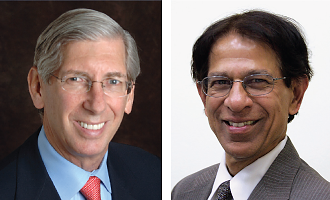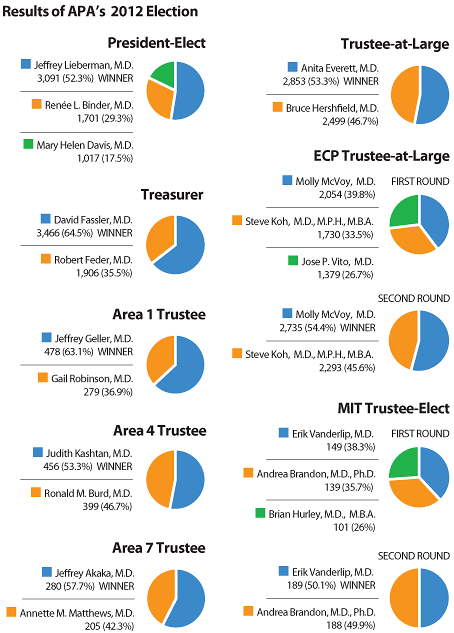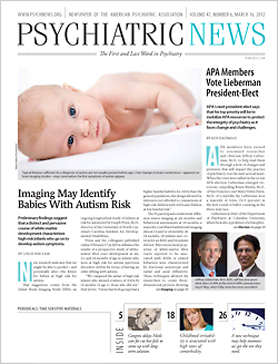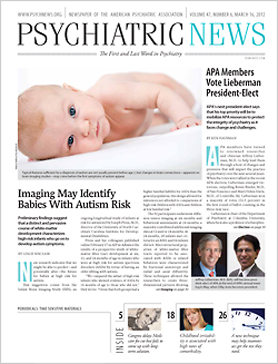APA members have turned to renowned researcher and clinician Jeffrey Lieberman, M.D., to help lead them through a host of changes and pressures that will impact the practice of psychiatry over the next several years. When the votes were tallied in the recent APA election, Lieberman emerged victorious, outpolling Renée Binder, M.D., of San Francisco and Mary Helen Davis, M.D., of Louisville, Ky. Lieberman won a majority of votes (52.3 percent) in the first round of ballot counting in the three-way race.
Lieberman is chair of the Department of Psychiatry at Columbia University, where he is also a professor of schizophrenia research, and is director of the New York State Psychiatric Institute. He also chairs the APA Council on Research and Quality Care and is an associate editor of the American Journal of Psychiatry.
While saying that he was “elated” to learn that he had won the election, he added that he was “sobered by the many challenges that face our field and the responsibility of leading the professional organization that is best positioned to represent the interests of psychiatrists and our hopes and aspirations as a profession.”
Lieberman added that “the old adage ‘may you be cursed to live in interesting times’ certainly applies to contemporary psychiatry. The ways in which mental health care and psychiatric services are delivered and financed will almost certainly be transformed within the next decade,” he told Psychiatric News. Psychiatrists “face the prospect of health care reform, value-based purchasing, shared risk by providers, and the implementation of bundled services and integrated care.”
“My top priority will be to mobilize APA’s resources to protect the integrity of psychiatric medicine. This will require proactively representing the interests of psychiatry to government and key stake-holder groups in order to influence health care legislation and policies on access to and funding for mental health care.”
He also cited as additional challenges facing the field multiple changes in education, certification, and licensure. “The financing of graduate medical education by the federal government is being reconsidered, while standards for maintaining specialty certification are being redefined. APA must monitor and influence these transformative processes and guide its members on how to adapt, while representing their best interests,” he said.
In the race for APA treasurer, Burlington, Vt., psychiatrist David Fassler, M.D., won election to another term in that post, defeating Robert Feder, M.D., of Manchester, N.H. Fassler received 64.5 percent of the votes to 35.5 percent for Feder.
Three of APA’s seven Area trustee positions were also up for election this year. In Area 1, which comprises the New England states and Ontario, Quebec, and Eastern Canada, Jeffrey Geller, M.D., won over Gail Robinson, M.D. Geller, of Worcester, Mass., garnered 63.1 percent of the votes, while Robinson, of Toronto, Canada, got 36.9 percent.
In Area 4, which includes most of the Midwest states, Judith Kashtan, M.D., of Minneapolis outpolled Ron Burd, M.D., of Fargo, N.D. Kashtan received 53.3 percent of the ballots to 46.7 percent for Burd.
Jeffrey Akaka, M.D., of Honolulu faced off against Annette Matthews, M.D., of Portland, Ore., in the contest to become the next Area 7 trustee. Akaka was the victor, winning 57.7 percent of the vote, while Matthews received 42.3 percent. Area 7 encompasses the far Western states (except California) plus Alaska, Hawaii, and Western Canada.
In the race for the Board’s trustee-at-large slot, two Marylanders faced off, with Anita Everett, M.D., besting Bruce Hershfield, M.D. She received 53.3 percent of the ballots, with Hershfield garnering 46.7 percent.
The early career psychiatrist (ECP) trustee-at-large position was also up for election this year. In a three-way race in which APA’s preferential balloting system was used because no one won a majority in the first round of ballot counting, Molly McVoy, M.D., of Cleveland, bested Steve Koh, M.D., of San Diego and Jose Vito, M.D., of New York. Vito came in third, so his votes were redistributed among McVoy and Koh depending on the number of his voters who indicated that one of the other two candidates was their second or third choice. McVoy then ended up with 54.4 percent of the vote.
The election for member-in-training trustee-elect (MITTE) also saw three candidates competing, with Erik Vanderlip, M.D., a resident at the University of Iowa, emerging as the winner. Coming in second was Andrea Brandon, M.D, a resident at New York University, while Brian Hurley, M.D., a resident at Massachusetts General Hospital and McLean Hospital, came in third. This was the election’s closest contest. After Hurley’s votes were redistributed, Vanderlip had 50.1 percent and Brandon had 49.9—the victory margin was one vote.
Approximately 20 percent of eligible voters cast ballots this year, down from about 25 percent last year, and 31 percent in 2009 and 2010.




